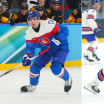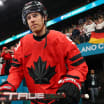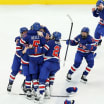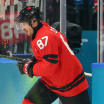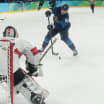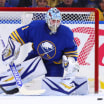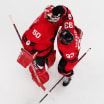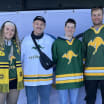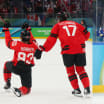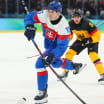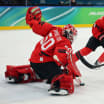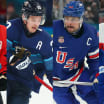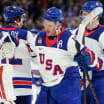Maurice Richard's list of accomplishments and NHL records are as long as the straight-blade sticks that he carried through 18 seasons, handled as both a scalpel and a bludgeon on his way to the Hockey Hall of Fame and hockey immortality.
Richard legacy burns bright for Canadiens, Quebec on 100th birthday
Legendary Rocket remains face of Montreal hockey
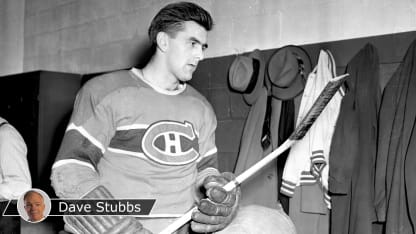
Born 100 years ago on Aug. 4, the Montreal Canadiens right wing remains the face of the franchise's greatest teams, captain for four of its historic five consecutive Stanley Cup championships from 1956 through his retirement in 1960.
On the centennial of his birth, more than two decades after his death to abdominal cancer in May 2000 at age 78, the "Rocket" -- so nicknamed for his explosive speed by 1940s teammate Ray Getliffe -- still transcends hockey in his native Montreal and Quebec.
Six decades after his retirement, Richard's legacy and his impact on the game and Quebec society are studied by fans and academics.
Maurice Richard, not yet nicknamed the Rocket, in a 1942 Canadiens portrait, during his first NHL season.
From the day he first pulled on a Canadiens sweater in 1942, a few early-career fractured bones the only speed bumps on his path to becoming the most fearsome forward of his generation, Richard would forever insist, "I'm just a hockey player."
But to French Canadians, and to the province that claimed him as its own and used him as a rallying cry during a time of political need, the Rocket was very much more than just a gifted goal scorer and the spark that ignited his team.
The first NHL player to reach 500 goals, Richard's offensive prowess is celebrated with the Maurice "Rocket" Richard Trophy, since 1998-99 annually won by the player scoring the most regular-season goals in the NHL. Richard would have captured the trophy five times, though he never won the Art Ross Trophy, awarded to the League's point-scoring leader.
The Rocket was the first to score 50 goals in a season, that milestone coming in the 50-game 1944-45 season. Upon retirement, he held NHL records for more regular-season goals (544) and points (965), both falling to his great Detroit Red Wings rival, Gordie Howe.
Maurice Richard skates the Montreal Forum ice during the 1945-46 season.
Richard won the Hart Trophy in 1946-47 voted as the most valuable player in the NHL, his only individual trophy, and six times was in the top three in voting for the award.
Terrifying goalies as much with his flashing eyes as his scoring touch from the blue line in, the Rocket was a battering ram who literally carried opponents on his back to the net.
Nobel-prize winning American novelist William Faulkner, writing for "Sports Illustrated" in 1955, suggested that Richard had "something of the passionate glittering fatal alien quality of snakes."
The same year, Canadian novelist Hugh MacLennan considered the Rocket's intensity in a "Saturday Night Magazine" profile:
"Every great player must expect to be marked closely, but for 10 years, the Rocket has been systematically heckled by rival coaches who knew intuitively that nobody can be more easily taken advantage of than a genius. Richard can stand any amount of roughness that comes naturally with the game, but after a night in which he has been cynically tripped, slashed, held, boarded and verbally insulted by lesser men, he is apt to go wild. His rage is curiously impersonal -- an explosion against frustration itself."
Maurice Richard shows some of his legendary intensity in a 1955-56 season Montreal Forum dressing-room photo.
Indeed, Richard's legendary short fuse was almost as famous as his skill, something many opponents exploited to perfection.
Sportswriter Trent Frayne, in a 1950s profile, spoke to the Rocket skating with a sweater crest that was more a bullseye than a CH:
"Richard scored goals from all angles and positions. Sometimes he scored them while lying flat on his back, with at least one defender clutching his stick, another hacking at his ankles and a third plucking thoughtfully at his sweater."
No one was closer to Richard's aura, and to all the qualities that made him whole, than Jean Beliveau, who would blaze a trail in the skate tracks that the Rocket carved in winning the Stanley Cup eight times.
Beliveau, who arrived in Montreal in 1953 and through the 1960s became the team's greatest captain, saw first-hand how much Richard meant to the Canadiens and the people who proverbially lived and died with the team.
Maurice Richard signs his final NHL contract, for the 1959-60 season, under the eye of Canadiens general manager Frank Selke Sr.
"The Canadiens may have been managed by Frank Selke, but they were really Joseph Henri Maurice Richard's team," he wrote in "My Life in Hockey," his 1994 autobiography. "The Rocket was the heart and soul of the Canadiens, an inspiration to us all, especially to younger French Canadians who were rising through the ranks. He was man and myth, larger than life in some ways, yet most ordinary human in others. …
"The timing of his contribution, from the war years through to 1960, coincided with that period in Quebec when a tidal wave of change was sweeping aside more than 300 years of history.
"As players, however, we saw Maurice in simpler, more immediate terms. He embodied something which would rub off on many of his teammates, something which would carry us to five straight championships by the end of the decade. Quite simply, Maurice Richard hated to lose with every fibre of his being."
Richard's remarkable life was celebrated with a state funeral -- a first for a non-political figure in Quebec -- that was telecast live across Canada.
Maurice Richard often played hurt, here on a training table being treated during the 1956-57 season by trainer Hec Dubois.
"Maurice Richard will forever be the man who defined and then embodied the purest hockey tradition," then-Canadian prime minister Jean Chretien said. "What really set him apart, and what his fans loved most about him, was his extraordinary intensity. He played with great feeling and flair and pursued victory like none other. The combination of passion and skill are what made him such a phenomenal player."
A century after his birth, 60 years after his 1961 induction into the Hall of Fame, the Rocket remains a brilliant light, both in fable and reality. Nowhere is he more beloved than in his native city, where he lit up the Forum and the hockey landscape like no one before him, or since.
Photos: Hockey Hall of Fame -- Turofsky (2); Le Studio de Hockey; Alain Brouillard; Louis Jaques; Turofsky

